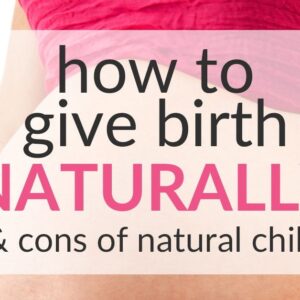
When you become pregnant, one thing that might weigh on your mind is the labor pain that you are supposed to endure.
While some women have relatively easy labors and deliveries, you more often hear the real horror stories about giving birth.
But why does it hurt to give birth?
The answer may seem obvious – a baby is to enter the world through your vagina… But there is a lot more to labor pain than that!
If you are ever afraid of something, one way to alleviate that fear is to learn about it, so take a look at some key pieces of information when it comes to labor pain.
Get immediate expert help with your pregnancy questions through JustAnswer Pregnancy:Labor Pain – Why It Hurts To Give Birth & How to Mitigate the Pain
- Body related reasons
- Physiological reasons (not as “normal”)
- Your position during the contractions
- Fear and anxiety
Body related reasons for labor pain
 The sources of labor pain that are most easy to understand and explain are functional.
The sources of labor pain that are most easy to understand and explain are functional.
These are the pains that occur because your body is opening and changing in order to deliver the baby, and though these sensations are certainly normal, they can be difficult to bear.
Labor pains result from i) the degree of dilation of your cervix, ii) from the position or descent of the baby, and iii) from the strength of your contractions, and this doesn’t even mention any extra pains that any medical procedures might cause you.
You’ll find that what these pains have in common is that they are caused by the way that your muscles are working so hard.
Relaxing the muscles instead of fighting the contractions, can alleviate the pain. Yep. That’s true. You can reduce body-related labor pain by relaxing. That’s why breathing and relaxation prenatal classes are so often recommended.
For me personally, once I understood that most of the labor pain is actually from the uterus changing shape rather than the baby pressing through the birth channel, I became less scared of giving birth.
I was always afraid that the baby would get stuck or something, and the thought of the baby pressing through for hour after hour was very frightening for me. Well, that’s not the case.
God knows why the dilation process has to be so painful, but at least it is only due to muscle work and preparing to give room for the baby to be born. That, I found it much easier to cope with!
Physiological reasons (not as “normal”)
Some sources of labor pain can be physiological, which means that the pain is a result of something happening that is out of the norm. This pain can be quite terrifying even for women who have given birth before.
The most common source of physiological labor pain is due to the position of the baby. A posterior baby, one who is facing up, can result in a substantial amount of back pain for the mother as can a breech baby, who is born feet-first.
These days, babies positioned with their feet down are often not born vaginally but through a cesarean. (In most cases, vaginal birth is also completely possible, but in this case, the risks tend to be a bit higher.)
Also, if your baby has a posterior position, it might be good to know that, in most cases, the baby turns right before being born. Talk to your midwife if you are worried!
Your position during the contractions
Your own positioning can also affect how much labor pain you experience.
People are beginning to understand that a birthing position that involves the mother lying flat on her back can actually increase the pain. More and more doctors are encouraging women to pace, kneel up, or squat to give birth, so think about these options before entering labor! The key is to make sure that you can relax your back and the pelvic area completely during the contractions; that way the pain is minimized.
To learn about birth positions that may reduce both labor pain and time, click here.
Fear and anxiety also increase labor pain
Finally, it is also important to remember that one of the leading causes of labor pain is fear or anxiety.
For instance, if you have no idea of what to expect from labor, you’ll find that the process is a great deal more terrifying if you can’t tell if something is normal or not. This tension can make your labor more frightening, and due to the nervousness you might feel, there is a chance it will make labor more difficult and more painful. Becoming educated on the process can alleviate this fear and help you prepare for the big day.
My prenatal yoga teacher told me about an experiment she had done when she gave birth to her first child. At this point in time, she lived somewhere in South America, and moms did not get their own room at the hospital.
My teacher had practiced breathing a lot and focused on relaxing and breathing during the contractions. But next to her was a woman who was obviously scared. She cried and yelled and was very tense during the contractions. My teacher decided to try doing that during one of her contractions. She did – and it was a nightmare. Much more painful than relaxing and focusing on breathing. She only tried once…
To me, it is amazing that a mom can decide to carry out such an experiment while giving birth – I sure didn’t! But I’m glad she did and told me the story; it really kept me motivated to practice my breathing and relaxation and to use that during labor and delivery.
Actually, if there is only one childbirth preparation you want to do – then please choose to learn relaxation and breathing! No matter how your birthing proceeds, this is something that will always be useful for you!
When it comes to labor pain, be aware that it will vary for every woman, but also remember that there are real causes for it and also real solutions, e.g., different types of pain relief.
Take some time to understand your body a little bit better, and make sure that when the time comes, you are prepared!
You’ll find a lot more childbirth tips here.
What are your thoughts on the fact that giving birth will hurt? Share what’s on your mind by leaving a comment below! :-) And good luck with your baby!

Paula Dennholt founded Easy Baby Life in 2006 and has been a passionate parenting and pregnancy writer since then. Her parenting approach and writing are based on studies in cognitive-behavioral models and therapy for children and her experience as a mother and stepmother. Life as a parent has convinced her of how crucial it is to put relationships before rules. She strongly believes in positive parenting and a science-based approach.
Paula cooperates with a team of pediatricians who assist in reviewing and writing articles.







Interesting article. I labored with my first for 12 hours (6cm) before needing an emergency c-section for fetal distress, so I can’t speak to the pushing part, but I was amazed at how well I was able to cope. So long as I focused on relaxation, contractions weren’t nearly as bad as I’d thought they would be. It felt like bad diarrhea to me. In fact, I had. Stomach bug a few months later and they felt the same to me. Expecting #2 now. I’m not afraid of contractions anymore. Hopefully I’ll have a positive VBAC experience!
Yes, it’s amazing! We are amazing. :-) I really stopped being afraid once I learned what the pain and contractions were. Thanks for sharing and good luck with your pregnancy and next labor!
xo, Paula